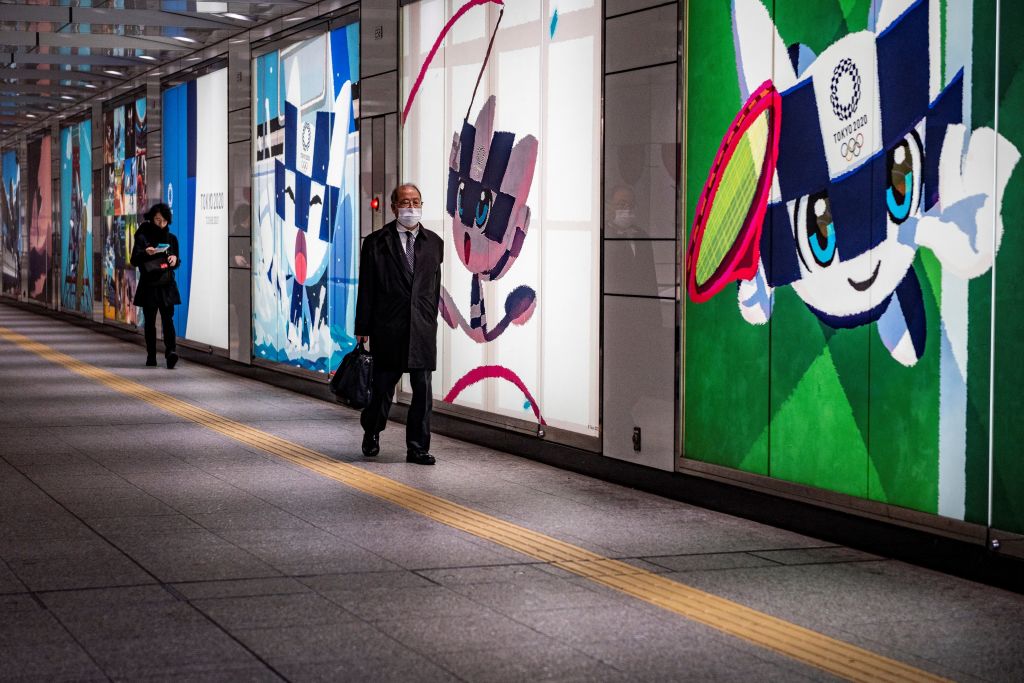Any long-term resident of Japan will know that ‘reading the air’, as the locals put it, is an essential skill for understanding what is really being communicated behind the glossy lacquer box patina of courtesy and understatement of Japanese discourse. Bad news is never expressed directly and you need to decode the subtle hints embedded in seemingly anodyne comments to get to the truth. For example, if a Japanese doctor ever tells you ‘it’s hard to say’ when you ask about your test results, it might be time to start getting your affairs in order.
As for the Tokyo Olympics 2020/21 (a saga approaching the length and complexity of the Tale of Genji), while the surface message is still superficially one of confidence and resolve, for those attuned to the subtext of official statements a happy ending to the story is looking increasingly unlikely. With a state of emergency declared for much of the country amid reports of surging coronavirus cases, many are starting to believe that it may soon be game(s) over.
The latest snippet of news comes from an unnamed senior source within the ruling coalition who reportedly concluded that the games were ‘doomed’ and the only issues that remain are how and when to break the bad news, and how best to minimize the financial and reputational fall-out. These comments haven’t been endorsed, or refuted, by Yoshihide Suga the prime minister.
The first hint that the unthinkable had become thinkable came when minister of administrative and regulatory reform Taro Kono said ‘anything is possible’ and ‘it could go either way’ when asked about plans for the games at a Reuters press conference last week. His comments were interpreted as opening the door to a possible cancellation, by testing how the public would react. The Olympic-weary public did react, with a devastating poll result: 80 percent of respondents favored another postponement or outright cancellation.
Kono, a rising star in the Liberal Democratic party, is popular and could well be the country’s next prime minister (he wants the job). His words and their timing will have been carefully chosen. Interestingly, he spoke in English, suggesting he intended his message for an international as well as local audience.
If the games are up, the implications hardly bear thinking about. About $25 billion has been plowed into the Olympic project so far: untangling the extant commercial contracts would be a Herculean task. There’s also the question of what to do with the facilities including the Olympic (Potemkin?) village under construction on the Harumi waterfront, and the gleaming new Olympic stadium at Shinanomachi, whose tiers are decorated with thousands of potted plants, which I notice, haven’t been pruned for months.
Then there’s the sheer dishonor involved in finally admitting defeat, which would be compounded by the fact that Tokyo would be, metaphorically at least, handing on the unlit Olympic torch to Beijing, host city of the 2022 winter games. Even the ultimate bow of shame ‘the dogeza’ would hardly be deep enough for that humiliation.
However, so far all we have are hints and unconfirmed comments. There is no doubt that the Japanese government and the IOC will do everything they can to salvage the project and Prime Minister Suga has declared that the games will go ahead if at all possible. He desperately needs some positive news to stem the growing impression that he is struggling in his new position and may have difficulty holding on to the top job when he needs to renew his leadership of the party at the end of the year.
He along with many others, including of course, the unfortunate athletes who have dedicated their lives to the pursuit of Olympic glory, are praying for a significant improvement in the COVID situation and a change of mood globally before a final decision must be taken in March in time for the start of the official torch relay.
Various contingency plans for a scaled down games have been floated. One idea is to reduce the number of participating athletes by almost half and cut back the entourages dramatically. The athletes would live in a socially distanced COVID-free village (and be forbidden to leave). They would perform in empty stadia, or in front of a limited number of spectators. There has been talk of fast-tracking athletes and support staff for COVID vaccinations ahead of the general public.
But it all sounds a bit joyless, and desperate, and with the legal, medical, and ethical complications involved, and especially in light of the latest rumors, more than a bit unlikely.
Few here are holding out much hope. It might be a while before it is openly expressed, but everyone I’ve asked whether it really is all over for the Tokyo Olympics has responded in a roughly similar manner: a sigh, pause of rueful reflection, then a variant of: ‘It’s hard to say.’
This article was originally published on The Spectator’s UK website.


















